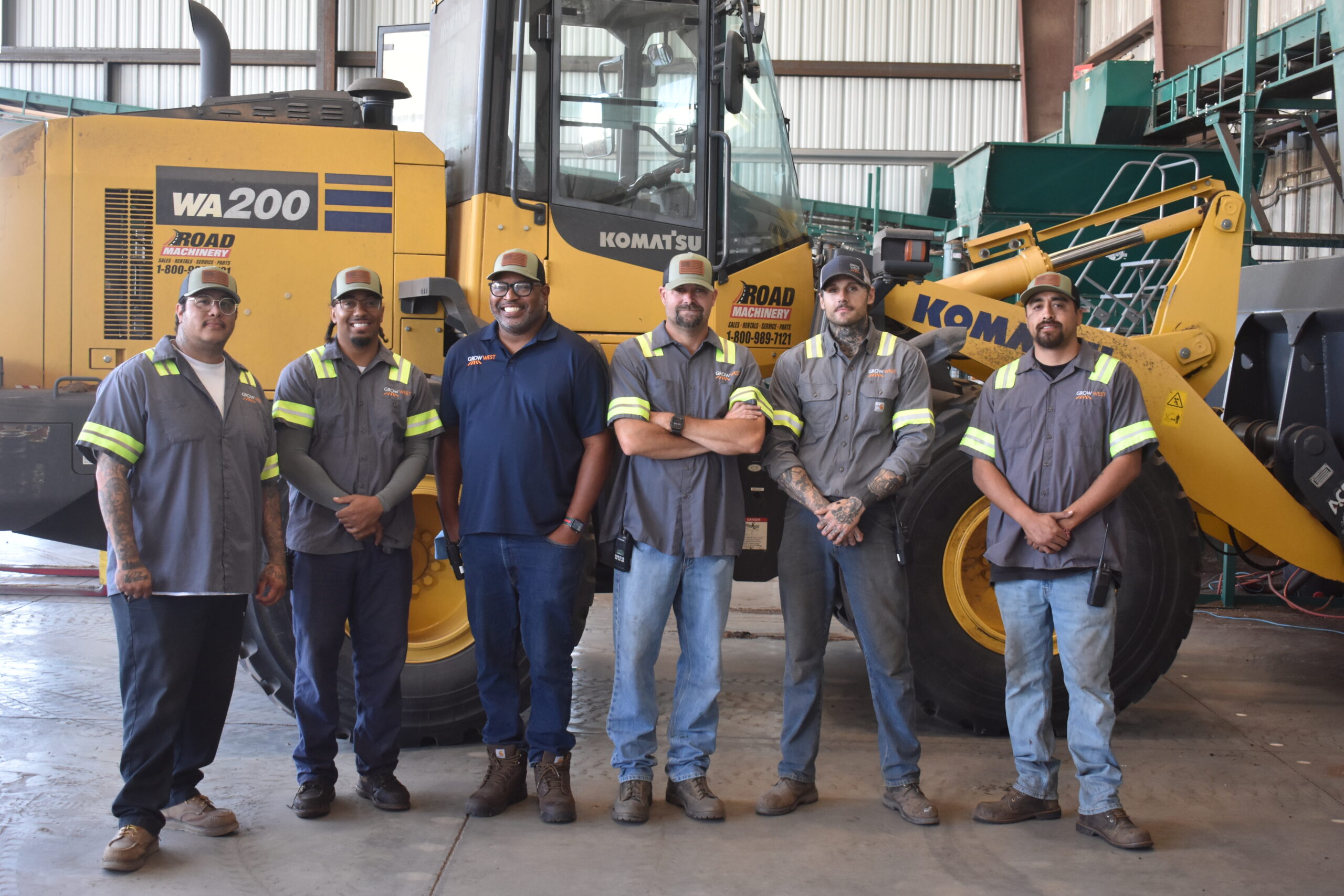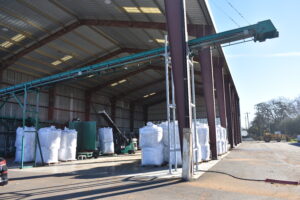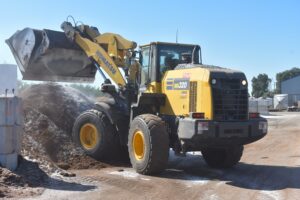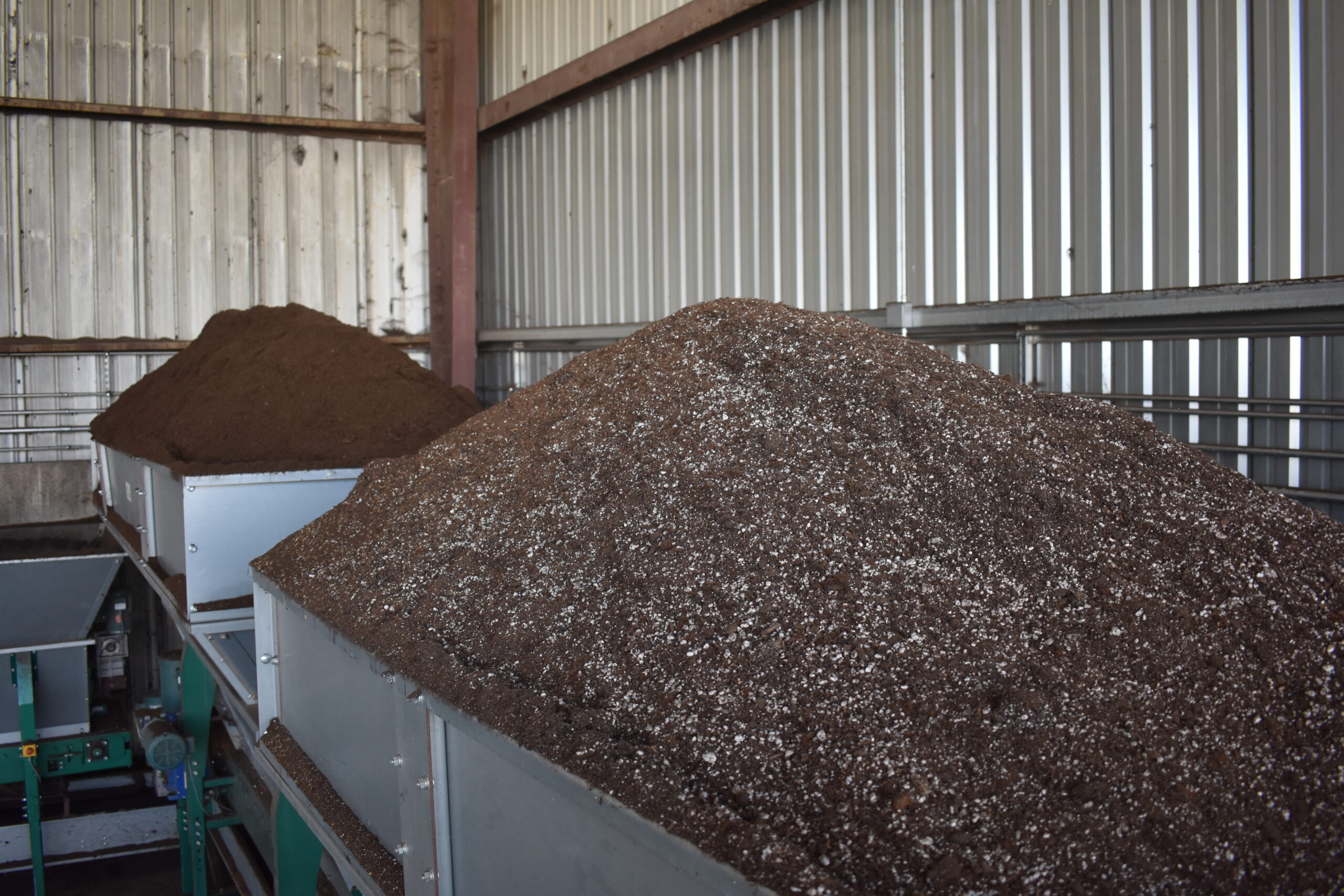Growing Together Summer 2025

Blended For Impact
How Grow West Soils serves California growers differently

As manager of the Grow West Soils Facility near Woodland, Ian Murray is like a master chef, following one of more than 350 computerized recipes on file to make the perfect soil blend.
If, on the outside chance, Murray doesn’t have what customers need, Soils Facility Office Coordinator Aaron Johnson will work with them to customize soil blends that will. Johnson will even provide them 5-gallon bucket samples to take back to their operations to try. The customer may return, asking if Grow West could add 5% perlite or maybe 10% more sand.
“We’ll go back and get that formula exactly the way they want it,” Murray said.
The personalized service also is part of Grow West’s philosophy to partner with customers to help them remain sustainable and profitable.
“It’s the customization component,” Grow West North Coast Regional Manager Devin Gordon said about their customer support. “They could come to us and have a blend made. Maybe they want to try a little bit of fertilizer or tweak the blend.” The alternative, which doesn’t involve individualized attention, is to just buy soil “off the shelf.”
Murray agreed. “We’re able to customize it exactly the way they want and also have their custom soil in 1-yard, 2-yard or 3-yard totes.” In addition, the facility can load it in bulk into a truck or pack it in 1-, 1.5- or 3-cubic-foot white bags for greenhouses or nurseries.

ORGANIC MARKET EVOLVES
The custom soil blending facility was born about six years ago when Grow West identified a unique opportunity to better serve its organic growers. More than 99.9% of the ingredients that go into the blends are organic, Murray said.
The effort was further solidified through a partnership with GreenGro Biologicals to blend and package its Pride Lands-branded products, which are considered a premium line. That arrangement continues today.
Murray said during the past few years, Grow West noticed a change in the organic market as it became more competitive. As a result, some customers shied away from the more premium soil blends.
To serve more price-conscious customers, Grow West launched a full soil line under the Blue Creek brand about a year and a half ago. Murray pointed to Grow West’s strong buying power that allows him to source products and make blends that still meet their customers’ needs but at a lower price point.
BULK, TOTES OR BAGS
As with other Grow West blends, Blue Creek products are organic and available to commercial customers in bulk, totes or bags. Not only are they competitive in the current market, but Murray said they’ve also attracted the attention of hydroponic vegetable growers.
As part of Grow West’s continuing effort to address market needs, the company plans to work with distributors to launch Blue Creek-branded organic soil products in 1-cubic-yard bags into retail garden centers in the coming months. In the meantime, Johnson is working with the California Department of Food and Agriculture to secure proper registration for the roughly half dozen products. And Murray said more Blue Creek bagged soil blends are in the works.
From the start, Grow West has only sold its soil blends wholesale to commercial growers or to distributors, who then sell them to retail outlets. The company also has done custom packs of branded products for small-scale garden centers, but it has never sold directly to retail customers. And that will continue, Murray said.
 HIGH-TECH SOIL BLENDING
HIGH-TECH SOIL BLENDING
Over the years, demand for Grow West’s custom soil products has grown, and with it the need to harness the latest technology.
Murray said he distinctly remembers when Grow West President and CEO Ernie Roncoroni and North Coast Regional Manager Gordon approached him about six years ago. At the time, Murray was working for another soil-blending company and Grow West was one of its biggest customers.
If Murray was interested in working for Grow West, he could run a planned state-of-the-art soil blending facility. “It made sense for me and my family,” Murray said.
The project came to fruition and the Grow West Soils Facility – with scalable custom soil blending – was completed near Woodland in 2023.
“We have a lot number for everything that gets built,” Gordon said. “The line is all automated. You put the mix into the line, the machinery takes over and the
blend comes out the other end.”
When Murray described Grow West’s potential custom soil offerings, he didn’t just talk about tapping a few ingredients, either. He has four different biochars, four brands of coco coir, four brands of peat moss, two brands of perlite and three different sizes, compost from three different companies, not to mention humus, worm castings, sand and myriad micronutrients and biological products at his fingertips.
“Diversity is the key,” Johnson said
SUSTAINABLE AND REGENERATIVE
More recently, Murray said he’s seen customers become more interested in regenerative and sustainable products. And a lot more ingredients are available now to meet those needs.
Peat moss, for example, is not as popular as it once was because it is harvested from bogs. As a result, some researchers have linked its removal to carbon emissions and wildlife habitat degradation.
Instead, some producers have turned to coco coir, a natural fiber extracted from coconut husks. About 95% of the world’s coco coir comes from India, Sri Lanka and Vietnam, and they sell the fibers to China to make doormats. The pithy leftover material is packed and sold to agricultural users who rehydrate it for use in soil media.
But Murray said much of that byproduct contains dirt and other contaminants. Instead, he sources Grow West’s coco coir from a company in the Philippines under contract with the U.S. Department of Agriculture for organic certification.
The company also processes it with agricultural and horticultural uses in mind, so it’s clean and contaminant free.
“A lot of the more sustainable products are handled a lot differently, which makes them better end products on our end,” Murray said.
